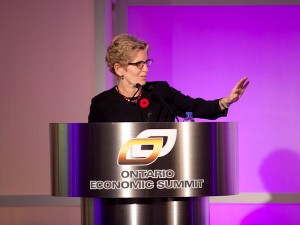New Ontario Premier Kathleen Wynne: differences and challenges

The new Ontario premier-designate, Kathleen Wynne. She was Minister of Transportation in 2010 when this photo was taken. Photo: Ontario Chamber of Commerce, CC some rights reserved
This past weekend Ontario’s Liberal Party chose a new leader, who will take over as premier from Dalton McGuinty.
The new premier-designate is Kathleen Wynne, a Toronto area member of the provincial parliament who was also a minister in McGuinty’s cabinet. (The term premier-designate applies until she is officially sworn in, which should happen soon.)
There’s a whole back story to McGuinty’s departure, including the prorogation of the Ontario Legislature. In the interest of keeping this simple, though, suspending the legislative body shall only get mentioned in passing. (Those interested can read more about prorogation and Canadian democracy from columnist Andrew Coyne, or this over-view from Martin Regg Cohn, Queen’s Park Columnist for the Toronto Star.)
Wynne (pronounced “win”) represents a couple of firsts: first female to hold this job in Ontario.
While this is significant, it’s hardly earth-shattering. Once Wynne is installed, women will head the provinces of B.C., Alberta, Ontario, Quebec, Newfoundland & Labrador – as well as the Territory of Nunavut. (An almost-current full list for all premiers is found here. Columnist Mia Rabson discusses the curent climate for women in Canadian politics here.)
Wynne is also the first openly-gay Canadian to hold office at this level, something she tackled head-on in the weekend’s leadership convention, as reported by the CBC:
“Is Ontario ready for a gay premier? You’ve all heard that question… Not surprisingly, I have an answer to that question,” Wynne said to cheers from her supporters.
“I do not believe that the people of Ontario judge their leaders on the basis of race, sexual orientation, colour or religion. I don’t believe they hold that prejudice in their hearts,” Wynne said. “They judge us on our merits.”
Wynne got the job by virtue of winning a party leadership convention, not a general electorate. But I think she’s gauged that correctly. Gay marriage has been legal across Canada since 2005 and this “issue” is fast becoming a non-issue for many voters.
In a post-victory column, Coyne writes that Wynne’s sexual orientation will prove “the least of her worries” as she works to address the flaws of the previous administration and the difficult fiscal picture in Ontario. Because results are what count and there are some tough rows to hoe out there.
Here’s the aspect I want to note and watch: Wynne has experience as a trained, professional mediator.
As present, she heads a minority government, meaning some compromise and cooperation is necessary to pass legislation and forestall a new election.
As is true in the U.S., politics in Canada is increasingly partisan, fractious and lacking in civility. There are all sorts of reasons why and plenty of blame to go around. But how to fix that – how to simply get on with functional governance – seems increasingly important.
Wynne is one person, representing a party that’s declining in the polls, and she faces many daunting challenges. Her success or failure will not prove the value of mediation as a political strategy.
But if skills in mediation do help break current log-jams, perhaps that can be a new tool more politicians will try to master.
Tags: canada, gay politicians in Canada, Kathleen Wynne, LGBT, mediation, Ontario, politics







